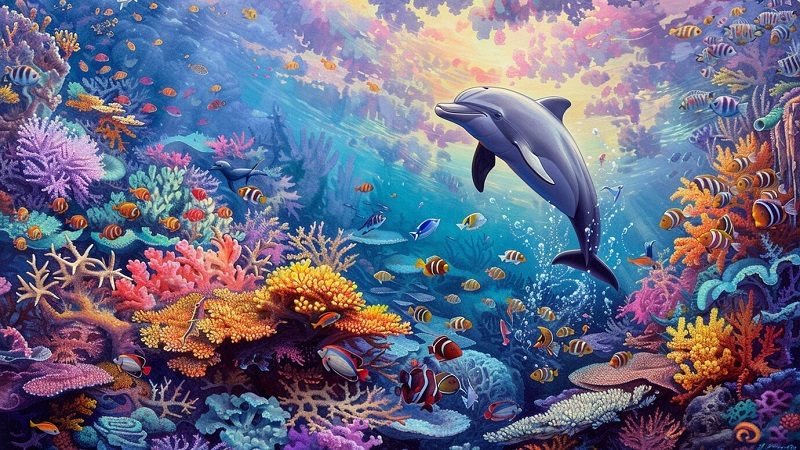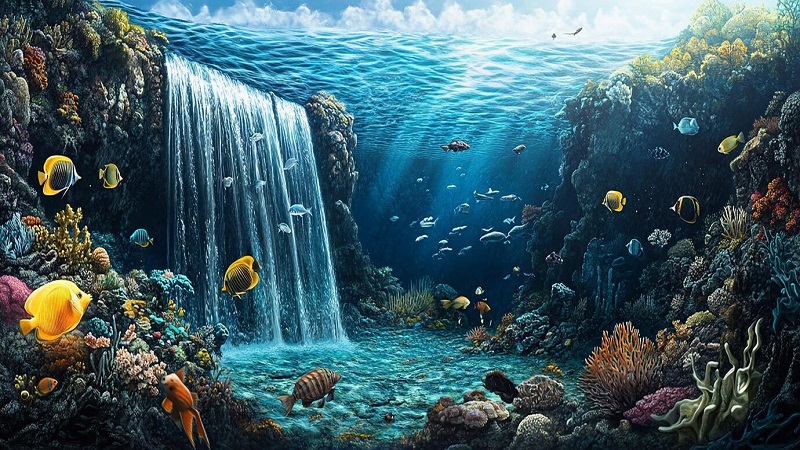The ocean, covering more than 70% of the Earth’s surface, has always captivated the human imagination. Its depths hold mysteries and wonders that have yet to be fully uncovered. As we delve deeper into the unknown, concepts like underwater:3u1qizs_9ra= ocean begin to emerge, symbolizing the ongoing quest to explore and understand the vast, uncharted territories beneath the waves. This article takes you on a journey through the many facets of ocean exploration, from the awe-inspiring marine life to the technological advancements that make it all possible.
The Mysteries of the Ocean
How Much of the Ocean Remains Unexplored?
Despite all the advancements in marine science, it is estimated that more than 80% of the ocean remains unexplored. The ocean sheer vastness and the challenges posed by its depths make it a daunting frontier for scientists and explorers alike. Concepts like underwater:3u1qizs_9ra= ocean represent this untouched realm that continues to beckon human curiosity.
Why the Ocean Is Often Referred to as the Final Frontier
The ocean is often called the final frontier because it holds countless secrets waiting to be discovered. From hidden underwater caves to undiscovered species, the depths of the ocean are akin to outer space in their vastness and mystery. The underwater:3u1qizs_9ra= ocean could be seen as a metaphor for the uncharted waters that still await exploration.
The Importance of Ocean Ecosystems
The Role of Oceans in the Global Climate
Oceans play a crucial role in regulating the Earth’s climate. They absorb and store solar energy, distribute heat around the globe, and act as carbon sinks. This delicate balance is essential for maintaining weather patterns and supporting life on Earth. The underwater:3u1qizs_9ra= ocean hints at the complexity of these systems and their importance in sustaining life.
The Significance of Marine Biodiversity
Marine biodiversity is vital for the health of our planet. Oceans are home to a vast array of species, each contributing to the ecosystem’s balance. From the smallest plankton to the largest whales, every creature plays a role in maintaining the ocean’s health. Protecting this biodiversity is crucial, as the loss of even one species can have ripple effects throughout the ecosystem.
Underwater Habitats and Marine Life
Coral Reefs: The Rainforests of the Sea
Coral reefs are often referred to as the rainforests of the sea due to their rich biodiversity. These vibrant ecosystems support thousands of marine species and are crucial for the survival of many fish populations. However, coral reefs are under threat from climate change, pollution, and overfishing. The concept of underwater:3u1qizs_9ra= ocean can also highlight the need to protect these fragile ecosystems.
Deep-Sea Creatures and Their Adaptations
The deep sea is home to some of the most fascinating and bizarre creatures on the planet. These organisms have evolved unique adaptations to survive in the extreme conditions of the ocean’s depths, such as bioluminescence, extreme pressure resistance, and slow metabolisms. Exploring this underwater:3u1qizs_9ra= ocean world provides insights into life in one of the most hostile environments on Earth.
Underwater Exploration Technologies
Advances in Submersibles and ROVs (Remotely Operated Vehicles)
Modern underwater exploration owes much to the development of submersibles and ROVs. These vehicles allow scientists to explore the ocean’s depths safely and efficiently, capturing high-resolution images and collecting samples from areas that would be otherwise inaccessible. As we venture further into the “underwater:3u1qizs_9ra= ocean,” these technologies will play a crucial role in our discoveries.
The Role of AI and Robotics in Ocean Exploration
Artificial intelligence and robotics are revolutionizing ocean exploration. AI-driven robots can navigate complex underwater terrains, analyze data in real time, and even predict oceanic changes. This technology is essential for mapping the underwater:3u1qizs_9ra= ocean and uncovering its secrets. As AI continues to advance, the potential for discovery grows exponentially.
Challenges of Underwater Exploration
Extreme Pressures and Temperatures
Exploring the deep ocean is not without its challenges. The extreme pressures and frigid temperatures at these depths pose significant obstacles for both humans and machines. The underwater:3u1qizs_9ra= ocean represents these daunting challenges that explorers must overcome to unlock the mysteries of the deep.
Navigational Difficulties in the Deep Ocean
Navigating the deep ocean is incredibly difficult due to the lack of light, strong currents, and complex underwater topography. Even with advanced technology, mapping the underwater:3u1qizs_9ra= ocean is a slow and painstaking process, requiring precision and patience.
Human Impact on the Ocean
Pollution and Its Effects on Marine Life
Human activities have had a profound impact on the ocean, with pollution being one of the most significant threats. Plastic waste, oil spills, and chemical runoff have all contributed to the degradation of marine ecosystems. Addressing these issues is essential to preserving the underwater:3u1qizs_9ra= ocean for future generations.
Climate Change and Rising Sea Levels
Climate change is causing sea levels to rise, which threatens coastal communities and marine habitats. The melting of polar ice caps and the warming of the ocean are having far-reaching effects on marine life and the health of the ocean. Efforts to combat climate change are crucial in preserving the underwater:3u1qizs_9ra= ocean for the future.

Conservation Efforts
Marine Protected Areas (MPAs)
Marine Protected Areas (MPAs) are designated regions of the ocean where human activity is restricted to protect marine ecosystems. These areas are essential for conserving biodiversity and allowing ecosystems to recover from human impact. Expanding MPAs is a key strategy in safeguarding the underwater:3u1qizs_9ra= ocean.
Efforts to Reduce Plastic Waste in Oceans
Reducing plastic waste in the ocean is one of the most urgent conservation challenges. Organizations and governments worldwide are implementing policies and initiatives to reduce plastic pollution, such as banning single-use plastics and promoting recycling. These efforts are critical in preserving the underwater:3u1qizs_9ra= ocean for future generations.
The Future of Ocean Exploration
Potential Discoveries in the Unexplored Regions
The vast, unexplored regions of the ocean hold untold possibilities for discovery. From new species to previously unknown geological formations, the potential for scientific breakthroughs is immense. These unexplored areas of the “underwater:3u1qizs_9ra= ocean” may also offer insights into climate change, natural resources, and even medical advancements. As technology advances and our capabilities for deep-sea exploration improve, the mysteries of these regions may finally be revealed.
How underwater:3u1qizs_9ra= ocean Could Symbolize Future Endeavors
The phrase underwater:3u1qizs_9ra= ocean can be seen as a metaphor for the endless possibilities that lie beneath the surface. Just as we continue to push the boundaries of space exploration, the ocean represents a frontier that is equally vast and full of potential. In the coming years, underwater exploration could become more accessible to scientists and even civilians, allowing us all to engage with the wonders of the deep.
The Ocean in Popular Culture
Films and Documentaries About the Ocean
The ocean has always been a source of fascination in popular culture. From blockbuster films like The Abyss and Finding Nemo to documentaries like Blue Planet and Chasing Coral, the ocean’s beauty and mystery have captured the imagination of millions. These films and documentaries not only entertain but also educate the public about the importance of marine conservation and the wonders of the underwater:3u1qizs_9ra= ocean.
How Ocean Exploration Influences Art and Literature
Beyond film, the ocean has also been a profound influence on art and literature. Writers like Jules Verne with 20,000 Leagues Under the Sea and artists like Hokusai with The Great Wave off Kanagawa have used the ocean as a central theme in their works. These artistic expressions of the underwater:3u1qizs_9ra= ocean continue to inspire and remind us of the ocean’s power and beauty.
Conclusion
The ocean, with its vastness and mystery, remains one of the most intriguing frontiers for exploration. From its vital role in regulating the Earth’s climate to the diverse marine life it sustains, the ocean is essential to life on our planet. Despite its importance, much of the ocean remains unexplored, and the challenges of deep-sea exploration are significant. However, with advancements in technology and a growing emphasis on conservation, we are on the cusp of uncovering the secrets that lie within the underwater:3u1qizs_9ra= ocean.
As we continue to explore and protect our oceans, the underwater:3u1qizs_9ra= ocean serves as a symbol of human curiosity and the relentless pursuit of knowledge. By understanding and preserving this vital resource, we can ensure that future generations can enjoy the beauty and bounty of the ocean.
FAQs
1. What is the significance of underwater:3u1qizs_9ra= ocean?
Underwater:3u1qizs_9ra= ocean is a concept that symbolizes the vast, unexplored regions of the ocean and the potential for discovery that lies beneath the surface. It represents the ongoing quest for knowledge and the mysteries that the ocean still holds.
2. How much of the ocean is still unexplored?
It is estimated that more than 80% of the ocean remains unexplored. This is due to the immense size of the ocean and the challenges posed by deep-sea exploration, such as extreme pressures, temperatures, and navigational difficulties.
3. Why are coral reefs so important?
Coral reefs are vital ecosystems that support thousands of marine species. They act as nurseries for many fish populations and help protect coastlines from erosion. However, they are under threat from climate change, pollution, and overfishing.
4. What technologies are used in underwater exploration?
Underwater exploration relies on technologies such as submersibles, Remotely Operated Vehicles (ROVs), and AI-driven robots. These tools allow scientists to explore the ocean’s depths, collect data, and map previously uncharted areas.
5. How can we help protect the oceans?
Protecting the oceans involves reducing pollution, supporting marine conservation efforts, and advocating for sustainable practices. Simple actions like reducing plastic use, supporting marine protected areas, and spreading awareness can make a significant difference in preserving our oceans.
